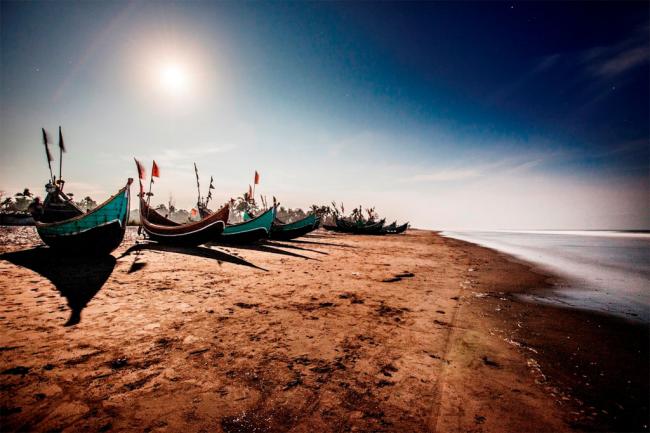Released on Friday, the Irregular Maritime Movements in South-East Asia report, documents an alarming rise in the number of Rohingya and Bangladeshis being smuggled across the Bay of Bengal and towards Thailand's border with Malaysia in the three-month period spanning January to March 2015.
Estimates now place the number of those crossing one of the world's most dangerous sea routes at 25,000.
At a recent press briefing in Geneva, spokesperson for the Office of the UN High Commissioner for Refugees (UNHCR) Adrian Edwards observed that the swelling number of migrants coincided with an increase in the profitability of smuggling in the region.
“Smuggling networks by sea from the Bay of Bengal area to Thailand and onwards to Malaysia have become increasingly lucrative for smugglers,” Edwards explained, “and increasingly dangerous for their human cargoes.”
In addition to the surge in crossings, the report also describes scenes of harrowing human experience as thousands of migrants are increasingly lured into life-threatening compromises by the smugglers themselves, signalling a stark shift in how smugglers recruit passengers.
During the reporting period, in fact, UNHCR staff spoke with several hundred survivors of such journeys and documented numerous cases in which passengers are initially lured by low boarding costs or free passage on condition that they repay the debt with future earnings in their country of destination.
On occasion, false promises of work and even small cash incentives are offered in order to sweeten the deal.
The prospects of a hopeful crossing, however, end there, as what begins as a journey of human smuggling is quickly transformed into human trafficking.
Those who change their minds about crossing the Bay of Bengal, for example, and ask to be let off the smugglers' boats are frequently forced to remain.
The UN agency has noted cases of children being abducted off the streets or while fishing and forced onto boats while, for the most part, people remain unaware that money will be extorted from them later in the journey.
In some cases, smugglers have even resorted to holding passengers for ransom at sea. Once payment is made, people are taken by fishing or speed boats directly to Malaysia.
According to a non-governmental organization's (NGO) estimates cited by UNHCR, currently several thousand people could be held – and dozens could have already died – in these 'offshore camps.'
Against that backdrop, irregular migrants are alsoPAYING for the Bay of Bengal crossings with their lives.
Based on survivor accounts, UNHCR estimates that 300 people died at sea in the first quarter of 2015 as a result of starvation, dehydration or abuse by boat crews. One survivor, the agency's report says, compared his 62 day experience at sea to a graveyard and said he lost hope of reaching shore alive.
The UN report comes just days after the grisly discovery of dozens of bodies in smugglers' camps in Thailand which prompted UNHCR's appeal for a regional effort to end human trafficking and protect those who escape difficult conditions from the hands of smugglers.
Photo: UNHCR/S. Alam
